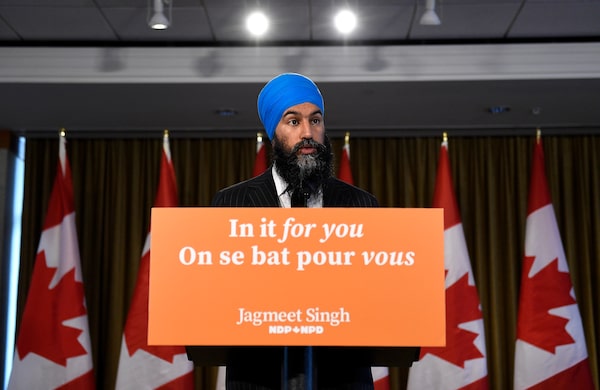
NDP Leader Jagmeet Singh's party picked up twice as many votes as the Bloc Québécois in Monday’s federal election but won eight fewer seats than the Bloc.Nathan Denette/The Canadian Press
It’s fascinating to hear critics of our first-past-the-post (FPTP) electoral system complain about how undemocratic it is. They never seem to have a problem identifying the flaws in our current system, all while conveniently overlooking its proven virtues.
They seem to think proportional representation (PR) is morally superior without considering the political dysfunction and paralysis it has created in other countries, where extremist parties routinely get a voice in government.
On Tuesday, New Democratic Party Leader Jagmeet Singh was deploring how “broken” our current FPTP system is. His party picked up twice as many votes as the Bloc Québécois in Monday’s federal election but won eight fewer seats than the Bloc, which only ran candidates in its home province. Under pure PR, the NDP would have won 54 seats instead of 24.
“I’ve long called for and continue to call for true electoral reform, which means, for me, giving power to people, having their voice be heard and so I believe in proportional representation,” Mr. Singh said, although he was characteristically clear as mud about what he intended to do about it. After all, in 2011, the NDP won precisely one-third of the seats in the House of Commons with 30.6 per cent of the popular vote.
Does that sound “broken” to you?
Our current system occasionally creates aberrations, but it usually reflects the wisdom of the Canadian crowd pretty accurately. Supporting any party over another requires your inner algorithm to sort through vast amounts of data to arrive at the conclusion that it best represents the values and policies you favour, all while having the leadership required to get the job done. For most of us, no party is a perfect fit.
And so we make trade-offs, just as we do in our personal lives. We accept that governing is hard. The demands placed on the modern state are all-encompassing. Governments must be responsive to those demands all while facing constraints and conditions – economic, social, environmental and international – that are beyond their control. Any adult understands that.
Third parties still play an important and constructive role in our system, reminding voters and the two main parties that Canadian democracy is not a duopoly. Either one of the current main parties can be replaced at the top of the political food chain if it drops the ball. Both the Liberals (2011) and Conservatives (1993) have fallen to third-party status in the recent past.
Proponents of PR, meanwhile, need to be coherent with themselves. You can’t call the distribution of seats produced in Monday’s election a “joke” and celebrate the fact that the People’s Party was shut out. Under PR, the far-right formation would have won six seats in the House, where it could have sown its anti-immigration mischief even more effectively.
Proportional representation encourages the formation of fringe parties at both ends of the spectrum. There is an inherent narrow-mindedness in such radicalism, which is why it’s not such a bad idea to set a high bar for any party to win seats in the legislature. In the age of social media, most people already live in ideological silos. Do we really want an electoral system that reinforces our worst tendencies and encourages further polarization?
Of course, most proposals for electoral reform in Canada have involved injecting elements of proportional representation into our current system, rather than adopting PR outright. Under a mixed member proportional (MMP) system, for instance, a majority of MPs would continue to be elected on a FPTP basis in ridings across the country. An additional group of MPs, about a third of the total, would be chosen from party lists based on the popular vote.
It’s not clear if MMP would generate dramatically different results than our current system. Had such a system been in place for Monday’s election, the Liberals might not have been shut out of Alberta and Saskatchewan entirely, although it is impossible to predict how voters would truly behave under such a system until we try it.
Besides, nothing short of pure PR would satisfy the loudest critics of our current system. They say every vote must count. They should be careful about what they wish for.
Our current system does an admirable job of sorting through the noise to reveal the signal that the electorate seeks to send. It is wrong to suggest that the outcome of Monday’s election is an aberration. Out of all the possible House of Commons configurations that might have emerged from the election, a Liberal minority is probably the one that most Canadians, regardless of whom they voted for, feel the most comfortable with.
 Konrad Yakabuski
Konrad Yakabuski